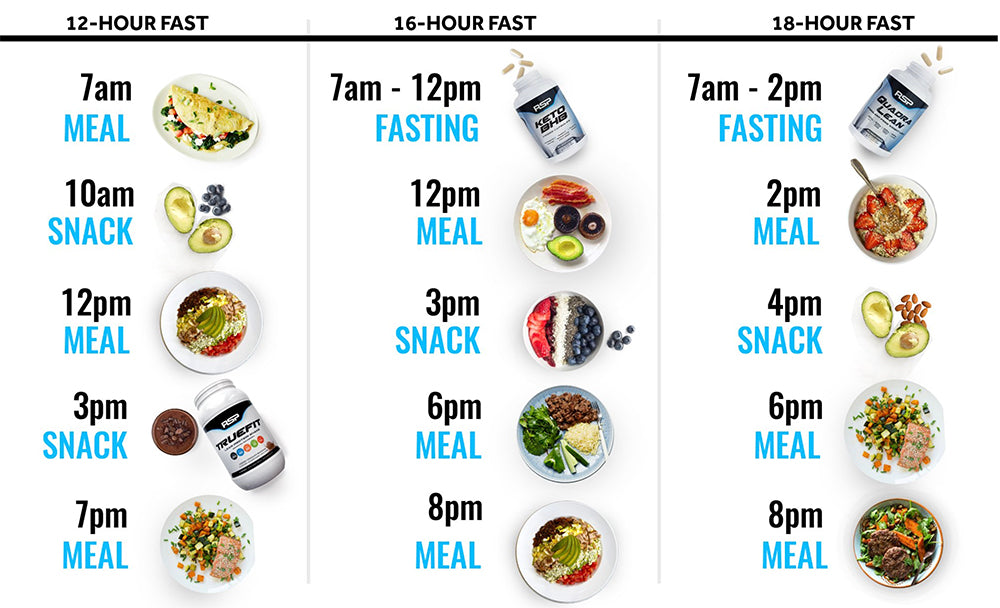Intermittent Fasting 1O1
You’ve probably heard the popular saying – “breakfast is the most important meal of the day”. In truth, a healthy breakfast from whole foods can be an enjoyable, hearty meal that fuels the body for the challenges ahead. For good reason, many wellness experts discourage skipping meals for fear that fasting will unnecessarily stress the body and could lead to erratic or binge eating.
However, because food hasn’t always been available on demand, human beings evolved on an irregular feeding schedule, often going 12-16 hours without a solid meal. So, from a metabolic perspective, human beings not only can survive, but also thrive while fasting.
What is Intermittent Fasting & What are the Benefits
Intermittent fasting, also known as IF, has myriad benefits for weight management, health and performance. Simply put, intermittent fasting involves voluntarily foregoing or delaying meals to achieve specific metabolic benefits. When incorporated into a healthy diet and exercise regimen, intermittent fasting may promote sustainable weight loss, increased energy, reduced oxidative stress and inflammation. Perhaps the best way to understand intermittent fasting is through the lens of the frustrated dieter or performance athlete. Maybe you’re one. Maybe you’ve wondered why your body tends to store excess fat, making it seem impossible to achieve your ideal body. Or, maybe you’ve hit a plateau while training for a race, competition or bragging rights at your local gym. Whatever challenges you face, intermittent fasting can help you break new ground on your fitness journey.
Will it help me lose weight?
First, let’s talk about how IF can support weight management. Most people consume diets high in carbohydrates and eat “three-square meals” spread evenly throughout the day. You use these meals for fuel– from work to play and back home again. The challenge with eating is that your body may use food in ways that don’t support your goals. For example, insulin, a hormone that enables the body to use carbohydrates for energy, also helps store glucose for future use. For many people, poor eating habits and insufficient exercise place them in a seemingly perpetual “fat storage” mode, making it difficult to lose weight and shed unwanted inches. The good news is – fasting can help jumpstart your body into fat loss, even without significantly restricting calories. Fasting naturally lowers insulin levels, enabling your body to convert stored body fat to energy. Combined with a quality, whole food diet and regular exercise, intermittent fasting can get you on the fast track to a lean body.
Can I Exercise While Fasting?
If you’ve never done IF, you may wonder if it’s safe to exercise during 12-16 hour fasts. Your trusted coach, trainer or nutritionist may have recommended a protein shake or snack to help fuel your exercise. While pre-workout meals or snacks can be great fitness aids, exercising in a fasted safe is not only safe; it may offer unique benefits that you’ve never experienced before.
Short-term fasting helps your body use its protein and glycogen more efficiently, boosting muscle growth, strength and endurance. Just make sure that you’re maintaining healthy daily caloric intake based on your size and gender, and you’ll be all set to train as hard as you ever have. To incorporate fasted exercise into your regimen, try a HIT, cardio or resistance/weight training workout in the morning 3-4 hours before your first meal of the day.
Let's Get Started
Intermittent fasting is fairly straightforward. Simply put, IF diets recommend a 12-18 hour fast in which you only consume liquids, such as water, tea or coffee. This pattern leaves you 6-12 hours for regular meals. Below are some examples schedules for an IF diet:

One thing we love about intermittent fasting is that you can incorporate it into a variety of popular diets, from plant-based to paleo lifestyles. Many IF dieters have found that fasting is particularly effective with ketogenic, or high fat diets. Keto dieting and intermittent fasting have a number of awesome synergies:
24-Hr Fat Burning
On ketogenic diets, your body burns fat for energy and fasts can expedite the process of converting fat into energy. Try a bulletproof coffee with grass-fed butter, ghee or MCT oil to promote thermogenesis during your fast. During fed periods, try adding a collagen protein powder to supplement your daily protein intake.
Stay Full All Day
High fat snacks and meals, especially those high in fiber, can help with satiety and reduce cravings for simple sugars and carbs during fasting periods. If you’re really struggling,Quadralean Stim-Free natural green tea extract can help you keep your hand out of the cookie jar, while Grains of Paradise Extract and L-Carnitine will help your body convert fat into energy.
Keto Aids for Performance
Supplements can help you stay on track during fasted and fed periods. BHB supplements, such as Keto BHB, provide carb free energy, improving mental focus and alertness.
We hope this gives you another wrinkle to add to your wellness program. Remember that the best way to get results on any program is to make sure that you’re getting calories primarily from whole foods and are maintaining a regular workout regimen, and that consistency is key. Intermittent fasting certainly isn’t a cure-all; but, it’s an excellent way to accelerate your fitness journey – no matter where you’re headed!
This article was written by RSP Nutrition and published on their website:
RSP Supplements are available here at Supplements Direct - Buy Now


